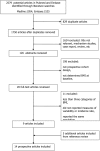Association of body mass index with bladder cancer risk: a dose-response meta-analysis of prospective cohort studies
- PMID: 28389625
- PMCID: PMC5464928
- DOI: 10.18632/oncotarget.16722
Association of body mass index with bladder cancer risk: a dose-response meta-analysis of prospective cohort studies
Abstract
Prospective epidemiologic studies on the association between body mass index (BMI) and bladder cancer yielded inconsistent findings. This study sought to quantitatively summarize the evidence by performing a dose-response meta-analysis on prospective cohort studies. Eligible studies were retrieved via PubMed and Embase databases, and by manual review of the references. Linear and nonlinear trend analyses were conducted to explore the relationships between BMI and bladder cancer risk. Meta-analyses on the categories of overweight and obesity were also conducted. The summary relative risk (SRR) was estimated. Heterogeneity across the studies was explored through subgroup analyses based on gender, age, year of publication, sample size, assessment of BMI, geographic location, physical activity and family history of cancer. A total of 14 prospective cohort studies involving 12,642 cases were included. Result of the dose-response analysis showed a nonlinear positive relationship between BMI and bladder cancer (SRR = 1.03, 95% CI: 1.01-1.06, P-nonlinearity =0.031), suggesting that per 5 kg/m2 increment on BMI corresponded to a 3.1 % increase of bladder cancer risk, especially BMI exceed 30kg/m2.Furthermore, significant positive association was also observed between obesity category and bladder cancer risk (SRR: 1.10, 95%CI: 1.03-1.17). In summary, this dose-response meta-analysis suggests a nonlinear positive association between BMI and bladder cancer risk. Further studies are required to confirm these findings and elucidate the pathogenic mechanisms.
Keywords: bladder cancer; body mass index; dose-response; meta-analysis; risk.
Conflict of interest statement
We declare that we have no conflicts of interest.
Figures




Similar articles
-
Obesity and risk of bladder cancer: a dose-response meta-analysis of 15 cohort studies.PLoS One. 2015 Mar 24;10(3):e0119313. doi: 10.1371/journal.pone.0119313. eCollection 2015. PLoS One. 2015. PMID: 25803438 Free PMC article. Review.
-
Body mass index and risk of gastric cancer: a meta-analysis of a population with more than ten million from 24 prospective studies.Cancer Epidemiol Biomarkers Prev. 2013 Aug;22(8):1395-408. doi: 10.1158/1055-9965.EPI-13-0042. Epub 2013 May 22. Cancer Epidemiol Biomarkers Prev. 2013. PMID: 23697611
-
Body Mass Index and Risk of Parkinson's Disease: A Dose-Response Meta-Analysis of Prospective Studies.PLoS One. 2015 Jun 29;10(6):e0131778. doi: 10.1371/journal.pone.0131778. eCollection 2015. PLoS One. 2015. PMID: 26121579 Free PMC article.
-
Egg consumption and risk of bladder cancer: a meta-analysis.Nutr Cancer. 2013;65(4):538-46. doi: 10.1080/01635581.2013.770041. Nutr Cancer. 2013. PMID: 23659445
-
A meta-analysis on the association between bladder cancer and occupation.Scand J Urol Nephrol Suppl. 2008 Sep;(218):64-78. doi: 10.1080/03008880802325192. Scand J Urol Nephrol Suppl. 2008. PMID: 18815919 Review.
Cited by
-
Diet and Exercise Are not Associated with Skeletal Muscle Mass and Sarcopenia in Patients with Bladder Cancer.Eur Urol Oncol. 2021 Apr;4(2):237-245. doi: 10.1016/j.euo.2019.04.012. Epub 2019 May 25. Eur Urol Oncol. 2021. PMID: 31133436 Free PMC article.
-
Predictors of Residual T1 High Grade on Re-Transurethral Resection in a Large Multi-Institutional Cohort of Patients with Primary T1 High-Grade/Grade 3 Bladder Cancer.J Cancer. 2018 Oct 20;9(22):4250-4254. doi: 10.7150/jca.26129. eCollection 2018. J Cancer. 2018. PMID: 30519326 Free PMC article.
-
The association of BMI with risk of recurrence and progression in patients with non-muscle-invasive bladder cancer.Transl Androl Urol. 2018 Dec;7(Suppl 6):S702-S705. doi: 10.21037/tau.2018.10.17. Transl Androl Urol. 2018. PMID: 30687600 Free PMC article. No abstract available.
-
Associating the risk of three urinary cancers with obesity and overweight: an overview with evidence mapping of systematic reviews.Syst Rev. 2021 Feb 17;10(1):58. doi: 10.1186/s13643-021-01606-8. Syst Rev. 2021. PMID: 33597037 Free PMC article. Review.
-
Body mass index modifies bladder cancer risk associated with low estrogen exposure among Egyptian women after menopause.Cancer Causes Control. 2019 Mar;30(3):249-258. doi: 10.1007/s10552-019-1131-7. Epub 2019 Jan 21. Cancer Causes Control. 2019. PMID: 30666489 Free PMC article.
References
-
- Li F, Hong X, Hou L, Lin F, Chen P, Pang S, Du Y, Huang H, Tan W. A greater number of dissected lymph nodes is associated with more favorable outcomes in bladder cancer treated by radical cystectomy: a meta-analysis. Oncotarget. 2016;7:61284–61294. doi: 10.18632/oncotarget.11343. - DOI - PMC - PubMed
-
- Silberstein JL, Parsons JK. Evidence-based principles of bladder cancer and diet. Urology. 2010;75:340–346. - PubMed
-
- Burger M, Catto JW, Dalbagni G, Grossman HB, Herr H, Karakiewicz P, Kassouf W, Kiemeney LA, La Vecchia C, Lotan Y. Epidemiology and risk factors of urothelial bladder cancer. Eur Urol. 2013;63:234–241. - PubMed
-
- Babjuk M, Burger M, Zigeuner R, Shariat SF, van Rhijn BW, Compérat E, Sylvester RJ, Kaasinen E, Böhle A, Palou Redorta J, Rouprêt M. European Association of Urology. EAU guidelines on non-muscle-invasive urothelial carcinoma of the bladder: update 2013. Eur Urol. 2013;64:639–653. - PubMed
Publication types
MeSH terms
LinkOut - more resources
Full Text Sources
Other Literature Sources
Medical

